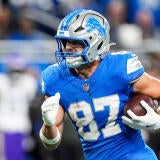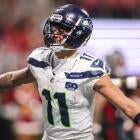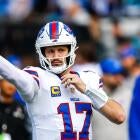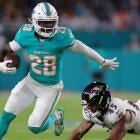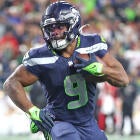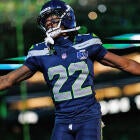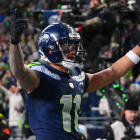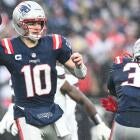Bell touched the ball 311 times in 15 games last season, so his upside should be undeniable. Yes, Frank Gore is there now, but Robby Anderson and Demaryius Thomas are gone. At the very least, you should feel confident Bell will see five targets per game, which by itself gives him top-12 upside. Bell should have regression coming in his rushing production. His 3.2 yards per carry last year was not just a career low, it was a major outlier. He's also the second biggest touchdown regression candidate in football after scoring four times in all of 2019. A realistic upside looks like 240 carries and 4 yards a pop and 70 catches for just over 500 yards. That's 1,500 total yards, which should come with at least eight total touchdowns. That's a borderline first-round pick, and Bell is available in the third or fourth round.
| ||||||||||||||||||||
Todd Gurley isn't actually old, but his knees qualify him for this discussion. He's not as likely to see 300 touches as Bell, but in Atlanta he could be a lot more productive with them. Let's start with what Devonta Freeman did last year. Freeman saw 70 targets in 14 games and put up 76.2 total yards per game despite terrible efficiency, a questionable offensive line, and the fact he played fewer than 60% of the snaps four different times. Three of those were blowout losses and the fourth he was injured. While Gurley may share early down work, he could easily see 80 targets in this offense and he's very likely to be the short yardage back since he's scored 42 rushing touchdowns since the start of 2017. Falcons running backs have averaged more than 14 total scores per season over the past three seasons. If Gurley's knees hold up his reasonable upside looks 220 carries at 4.2 yards per carry (924) yards and 55 catches for 440 yards. Where Gurley could crush Bell is in the red zone. It's reasonable to think he could score 12 times in Atlanta in 2020.
| ||||||||||||||||||||
David Johnson is the back you have to get creative with to find his upside. That's because of how different things could look in Houston this year. The Texans traded their 10-target per game alpha No. 1 for Johnson. To see his upside you must assume that trade means a shift in their target distribution. But first, a reminder that Carlos Hyde ran for 1,000 yards and six touchdowns in this offense last year. You can't put any rushing upside for Johnson below that. Hyde was RB28 for the year with just 10 catches for 42 yards and no scores. Johnson has averaged 10.7 yards per reception for his career, so you have to assume the Texans will throw the ball to him considerably more than they did Hyde. Johnson's upside starts with a similar 245 carries for 1,070 rushing yards, but includes three targets per game. That should translate to around 35 catches for 350 yards and two more scores. If you add those receiving numbers to what Hyde did in 2019, you basically have Joe Mixon's 2019 Fantasy total.
| ||||||||||||||||||||
So we have to turn back the clock a bit for this one. Yes, A.J. Green has only played nine games since 2017. But let's remember what he did in those nine games. He averaged 77.1 yards per game and scored six times. He was a top-10 receiver in all formats. The year before he played 16 games and finished as the No. 10 receiver in Fantasy. In fact, he's never played 16 games and finished outside of the top 10 receivers. While there's some risk playing with a rookie quarterback, we're talking about upside, and it's undeniable that Joe Burrow provides more upside than Andy Dalton. If this team throws 600 times as we expect, Green could see a quarter of those targets. At his career rates that's 88 catches for 1,300 yards and nine touchdowns. Maybe that doesn't quite feel reasonable, but it's certainly upside.
| ||||||||||||||||||||
No matter how much Mike Zimmer hates it, we expect Minnesota is going to throw more than it did last year. The defense will likely regress and history shows us that most teams who are outliers like the Vikings were in 2019 regress towards the mean at least a little. That could be huge for Adam Thielen now that Stefon Diggs is gone. Thielen's upside starts with a 28% target share, which sounds outlandish until you recall that Thielen saw 25% of the team's targets with Diggs on the field. If Kirk Cousins throws 520 passes (still well below league average), that would be 145 targets for Thielen. He has not had one season below 8.7 yards per target in the past four and he averaged 9 yards per target on 153 targets in 2018. In that season he caught 113 passes for 1,373 yards and nine touchdowns. Michael Thomas was the only receiver in 2019 who scored more PPR points than Thielen did in 2018. Even if you want to pull back on those 2018 numbers 10% there is clear top-five upside.
| ||||||||||||||||||||
Philip Rivers' habits are well established. He peppers his No. 1 receiver with targets and he dumps the ball off to his running backs. Keenan Allen has seen at least 136 targets each of the past three seasons with Rivers. While we don't expect Indianapolis to throw the ball as much as the Chargers did, Hilton posted 76-1,270-6 the last time he saw even 120 targets. The past two seasons he played with Andrew Luck he averaged 90 yards per game. A reasonable upside for Hilton's targets is probably closer to 130, which would mean somewhere around 80 catches for 1,200 yards and seven touchdowns. That's a high-end No. 2 receiver, which is pretty fantastic in Round 5 or 6.
| ||||||||||||||||||||
Fantasy Football Draft Prep: Le'Veon Bell, A.J. Green and other older guys with upside
You don't have to be young to have upside. Here are the veterans who are ready to prove it.

There are few things, if any, more important in Fantasy Football than upside. The player who greatly outperforms expectations is the most valuable player on your roster. Just ask anyone who drafted Christian McCaffrey, Michael Thomas or Lamar Jackson last year. Those league-winners, as we call them, are the players we spend the most time trying to prognosticate. As we should. I'm just not so sure we should be quite so narrow when establishing our search parameters.
Specifically, I'm not sure we should be quite so ageist. It seems, based on most of the analysis, that the best case for a player's upside is either their youth or their efficiency in a very small sample size. And I don't want to act as if those things can't portend success. Any sort of success at a young age in the NFL is a positive. It's rare that a 21-year-old has a 'good' season that doesn't eventually lead to a 'great' season. My problem is not with assigning upside to guys like D.J. Moore, A.J. Brown or Kyler Murray. They certainly have it. My problem is the players whose upside we ignore.
Mark Ingram, Darren Waller and Julian Edelman flashed incredible upside in 2019 despite their lack of youth. In 2018 Matt Ryan, Ben Roethlisberger, Adam Thielen and Jared Cook turned a profit for Fantasy managers. While I'm not saying we should automatically look to veterans for our upside plays, I also don't believe we should overlook them. This is especially true in 2020 because of the influx of young talent at running back and wide receiver. That's caused the industry to overlook the upside for some veterans who have been elite in the past but just weren't last year.
Here are a half dozen veterans with upside you shouldn't overlook on Draft Day. To be upfront, all of these players have downside. They have injury risk, they have age concerns, they have situational concerns. But there's been no shortage of coverage of their concerns, we're here to talk about their upside.
Le'Veon Bell
Todd Gurley
David Johnson
A.J. Green
T.Y. Hilton
Adam Thielen
Which players are poised for breakouts, which sleepers do you need to jump on, and which busts should you avoid at all costs in your Fantasy football league? Visit SportsLine now to get early rankings, plus see which WR is going to come out of nowhere to crack the top 10, all from the model that out-performed experts big time last season.







